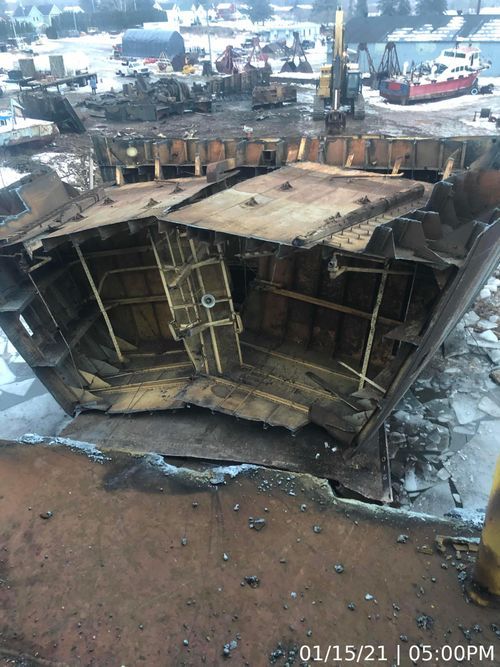Introduction:
Ship recycling, also known as ship demolition or ship dismantling, is an essential process for managing the end-of-life of ships and marine vessels. With the increasing demand for environmentally responsible solutions, the ship recycling industry has become a crucial player in promoting sustainability and reducing waste. This blog post explores best practices for safe and efficient ship recycling, highlighting RJ Industrial's expertise in providing comprehensive marine scrap services and how we incorporate our core services and keywords, such as industrial scrap recycling and commercial scrap services.
The Importance of Ship Recycling:
Recycling ships involves dismantling them to recover valuable materials, such as steel, aluminum, and copper, which can be reused in various industries. This process not only conserves natural resources but also minimizes the environmental impact of ship disposal. Proper ship recycling prevents hazardous materials, like asbestos and oil, from polluting the environment and contributes to reducing greenhouse gas emissions.
Best Practices for Safe and Efficient Ship Demolition:
- Comprehensive Planning and Assessment:
- Before beginning any ship recycling project, it's essential to conduct a thorough assessment of the vessel to identify potential hazards and valuable materials. This includes examining the ship's structure, inventorying hazardous materials, and developing a detailed demolition plan. At RJ Industrial, our experts meticulously plan each project to ensure maximum efficiency and safety, utilizing our industrial scrap services and expertise in demolition.
- Adhering to International Standards:
- Compliance with international regulations and standards is crucial for ensuring safety and environmental protection in ship recycling. The Hong Kong International Convention for the Safe and Environmentally Sound Recycling of Ships provides guidelines for managing hazardous materials and protecting workers. RJ Industrial adheres to these standards, ensuring that our ship recycling practices are environmentally responsible and globally compliant.
- Implementing Safety Protocols:
- Safety is paramount in ship recycling. Implementing stringent safety protocols helps protect workers from potential hazards, such as toxic fumes, falling debris, and hazardous materials. This includes providing personal protective equipment (PPE), conducting regular safety training, and monitoring worksite conditions. RJ Industrial prioritizes safety, ensuring that all team members are trained and equipped to handle challenging conditions while performing tasks such as machinery removal and plant dismantling.
- Efficient Material Recovery:
- Maximizing material recovery is a key goal in ship recycling. By using advanced sorting and processing techniques, valuable metals and components can be efficiently extracted and prepared for reuse. Technologies like sensor-based sorting and automated machinery enhance the accuracy and efficiency of material recovery, reducing waste and increasing profitability. RJ Industrial leverages our expertise in industrial metal recycling and commercial metal recycling to optimize material recovery processes.
- Environmentally Responsible Hazardous Material Management:
- Proper handling and disposal of hazardous materials are critical for minimizing environmental impact. This includes safely removing and disposing of asbestos, oil residues, polychlorinated biphenyls (PCBs), and other toxic substances. RJ Industrial employs specialized techniques and equipment to manage hazardous materials, ensuring compliance with environmental regulations and safeguarding ecosystems through our demolition waste recycling and off-site scrap services.
- Collaboration with Certified Facilities:
- Partnering with certified ship recycling facilities ensures that ships are dismantled and recycled in a safe and environmentally friendly manner. These facilities are equipped with the necessary infrastructure and expertise to manage large-scale demolition projects and handle hazardous materials responsibly.
- Continuous Monitoring and Improvement:
- Continuous monitoring and improvement are essential for maintaining high standards in ship recycling. By evaluating project outcomes and identifying areas for improvement, recycling companies can enhance their processes and achieve greater efficiency and safety. RJ Industrial is committed to continuous improvement, leveraging our experience and expertise to deliver top-quality ship recycling services.
RJ Industrial’s Expertise in Ship Recycling:
RJ Industrial is a leader in providing comprehensive ship recycling services, offering expertise in marine scrap services, ship demolition, and ship dismantling. Our team is dedicated to ensuring safe and efficient recycling, adhering to international standards and best practices. With a focus on environmental responsibility and client satisfaction, we deliver exceptional results for a wide range of ship recycling projects. Our services also extend to railroad scrap metal, railcar recycling, and freightliner scrap services.
Conclusion:
Ship recycling is a vital process for promoting sustainability and environmental responsibility in the maritime industry. By following best practices for safe and efficient demolition, companies can maximize material recovery, minimize environmental impact, and ensure worker safety. RJ Industrial's commitment to excellence in ship recycling and other related services, such as equipment decommissioning and industrial site clearance, makes us a trusted partner for marine scrap services. Contact us to learn more about our ship recycling solutions and how we can assist with your next project.
